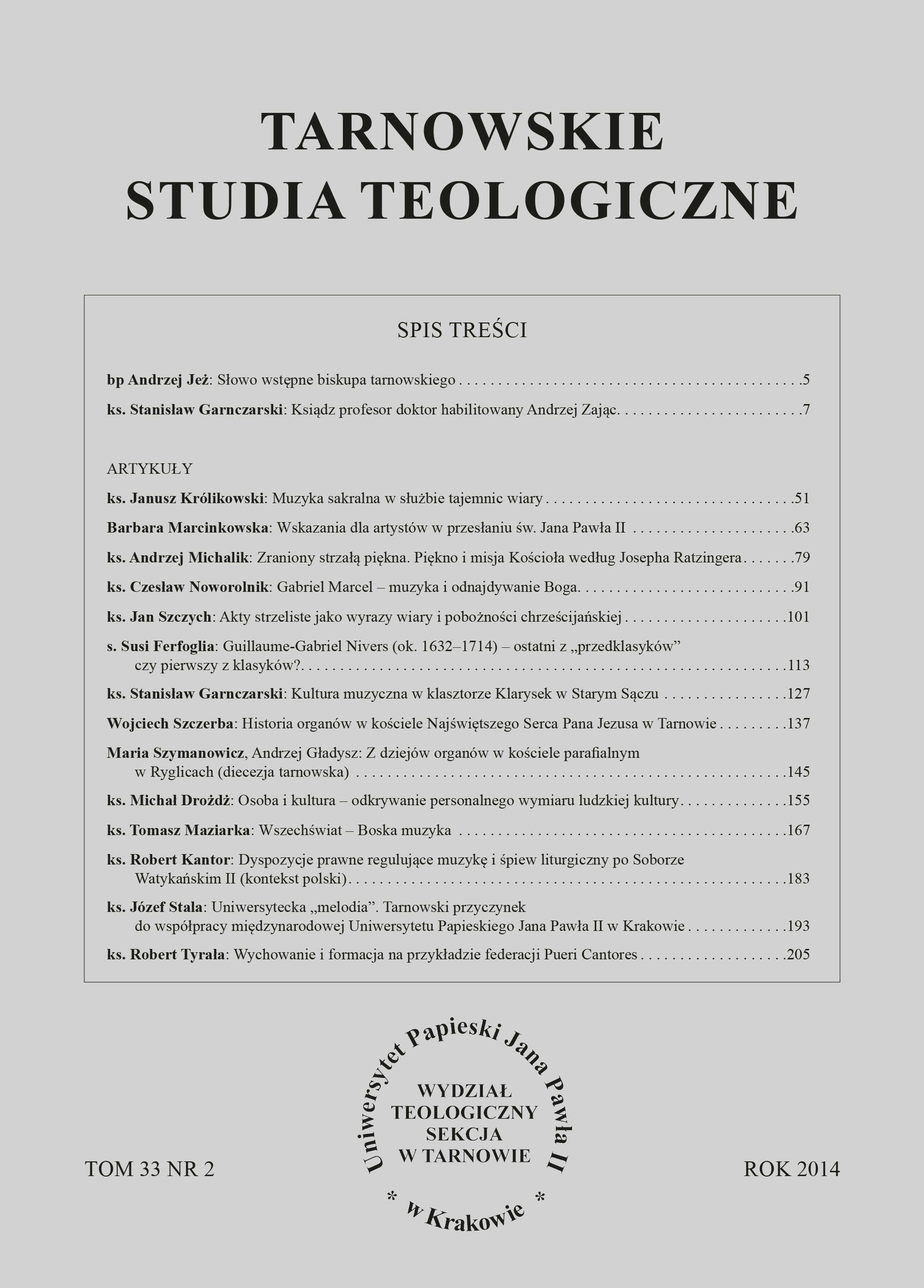Wychowanie i formacja na przykładzie federacji Pueri Cantores
DOI:
https://doi.org/10.15633/tst.697Keywords:
education, tutoring, formation, Pueri Cantores, Rev. Ferdinand Maillet, sacred music, choral music, Christian values, Memorandum on The Identification and the Essence of Pueri CantoresAbstract
Education and formation are the two key words of tremendous importance in the activity of the International Federation of Pueri Cantores. Learning the Christian values and deepening faith both derive from the identity of and identification with the group which Pueri Cantores is. Creative education, commonly associated with musical formation of young people, is a peculiar quality characterizing this church movement. The Pueri Cantores actions performed in many countries of the world, counting today almost 40, prove the growing effectiveness and popularity of this Federation. And such is are the aims which were officially approved by its Presidents in the document ratified in Paris last year.
The history of the Pueri Cantores community has featured a great number of excellent tutors and educators. Their remarkable activities are certified by their living pupils, acting and developing worldwide. Amongst these magnificent pillars of the Federation was Siegfried Koesler, deceased two years ago, a great friend of the Polish Federation of Pueri Cantores and of the main celebrator of today’s anniversary. The entire international community of Pueri Cantores Presidents, Correspondents and Guests shall meet on 24–26 October 2014 in Würzburg so as to commemorate this great and good teacher. At the funeral service of Siegfried Koesler at Würzburg cemetery on 5 December 2012 I said on behalf of the International Federation of Pueri Cantores: „Thank you fory your shiny example. You were for us a living sign of God’s presence amongst us. Your thoughts and deeds shall remain in us for they have stayed alive in our hearts. You will live in us. Your remarkably good manners, culture and life, permeated with God’s presence, will always be an inspiration and encouragement for us in our aiming at ideals, to which you were invariably faithful” (R. Tyrała, The 10th Letter of President of FIPC, Kraków 2014. Archives of the International Federation of Pueri Cantores in Rome). It is a matter of undeniable certainty that the modern world, the modern Church and we ourselves need such authentic educators and authorities.
May the conclusion of these few thoughts on educating through music, as exemplified by the Federation of Pueri Cantores, be the words expressed by the man who, like anyone else, knows how to run a choir, and educate and form young people: „I believe, working with a choir in respect of human activity belongs to a hierarchy of values. Because man as such is a value himself. And this man, whether a child or an adult singing in our choir, whom God provided with abilities to sing and with musical sensitivity, and whom He entrusted to us, choirmasters so we would educate, tutor and form, is truly worth a trial” (A. Zając, Chór kościelny – środowiskiem edukacyjnym, wychowawczym i formacyjnym. Sacred Choir – An Educational, Tutorial and Formative Environment, w: Pro Musica Sacra, t. III, Kraków 2006, p. 80).
Downloads
Published
Issue
Section
License
Authors who publish with this journal agree to the following terms:
- Authors retain the copyright and full publishing rights without restrictions, and grant the journal right of first publication with the work simultaneously licensed under a Creative Commons Attribution 4.0 International License that allows others to share the work with an acknowledgement of the work's authorship and initial publication in this journal.
- Authors are able to enter into separate, additional contractual arrangements for the non-exclusive distribution of the journal's published version of the work (e.g., post it to an institutional repository or publish it in a book), with an acknowledgement of its initial publication in this journal.
- Authors are permitted and encouraged to post their work online (e.g., in institutional repositories or on their website) prior to and during the submission process, as it can lead to productive exchanges, as well as earlier and greater citation of published work (See The Effect of Open Access).

